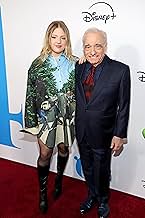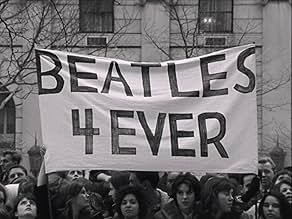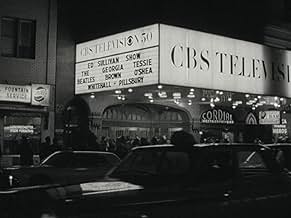Beatles '64
- 2024
- 1 Std. 46 Min.
Füge eine Handlung in deiner Sprache hinzuCaptures the band's electrifying 1964 US debut amid fan frenzy. With rare behind-the-scenes footage, it chronicles their unprecedented rise to global superstardom after performing on The Ed ... Alles lesenCaptures the band's electrifying 1964 US debut amid fan frenzy. With rare behind-the-scenes footage, it chronicles their unprecedented rise to global superstardom after performing on The Ed Sullivan Show to over 73 million viewers.Captures the band's electrifying 1964 US debut amid fan frenzy. With rare behind-the-scenes footage, it chronicles their unprecedented rise to global superstardom after performing on The Ed Sullivan Show to over 73 million viewers.
- Auszeichnungen
- 4 Nominierungen insgesamt
- Themselves
- (Archivfilmmaterial)
- Self
- (Archivfilmmaterial)
- Self
- (Archivfilmmaterial)
- Self - The Ronettes
- (Archivfilmmaterial)
- Self - Artist
- (as Sananda Maitreya)
- …
Empfohlene Bewertungen
And that's coming from someone who loved: Get Back (10/10), Rooftop Concert (10/10), A Hard Days Night, and Help.
There are lots of "talking heads" interviews which are okay, but not really all that exciting to watch. Some are more interesting than others.
The old footage of The Beatles performing and not performing is the most enjoyable to watch. I saw quite a bit of footage that I had never seen before and there are some wonderful moments.
There are also some ugly moments, too. There's one moment when a New York City cop threatens to throw two teenage girls down a flight of stairs just because they aren't staying at the hotel. Yikes! Talk about police brutality! The girls were very peaceful and didn't deserve that.
There's also an ugly moment when some random male adult is telling young teenage girls that their love of The Beatles is "psycho-sexual" and that they are "sick". That guy seemed totally perverted! He was the one who was "sick". What a weirdo.
The musical performances sounded really good, especially listening with headphones.
Anyway, overall I enjoyed it quite a bit and would recommend watching it.
The footage is fascinating not just because it includes the band performing live on Sullivan, at the Washington Coliseum, and at Carnegie Hall, but rather because it puts us in the Plaza Hotel room where they stayed, and in the backseat of the cars as they are transported. We hear interviews and conversations, and gain some perspective on what these young men went through physically and emotionally and musically on their first trip across the pond. Girls were hyped for this group of four lads who certainly didn't fit the mold of traditional masculinity, while parents were caught off-guard.
What I found most thought-provoking of all was Tedeschi's presentation as history intertwined with one of the most impactful moments in U. S. history. President John F Kennedy was assassinated on November 22, 1963. The plane carrying The Beatles touched down on February 7, 1964. In plain language, Beatlemania struck as a nation mourned. You may view these as unrelated, but music is known to heal. Perhaps the frenzied young fan reactions to "I Want to Hold Your Hand" that caused the rift with parents and older Americans was just the diversion needed to help a country move forward. That first appearance on the Sullivan show took place on February 9.
Tedeschi supplements the video with a multitude of interviews. We hear from fans, other musicians, and the band members themselves ... even Marshal McLuhan. Surviving members Paul and Ringo were involved in the film's production, as were the estates of John and George. Archival interviews are included here - George from his own lawn, and John on a couple of TV talk shows. Paul is shown at the museum that featured Beatles photography. Yet, the interview that packs the biggest punch is likely that of Ronald Isley of The Isley Brothers. He acknowledges the impact of sales when The Beatles recorded "Twist and Shout", and he punctuates this with the fact that it did not lead to an invitation for The Isley Brothers to perform on the Sullivan show.
It's clear how much respect these four young lads had for black musicians and how much their music influenced The Beatles. They were excited to meet with and learn more about the key black musicians such as Little Richard or the Ronettes. Ronnie Spector is interviewed here and offers her recollection of the band, the music, and the times. Tedeschi's (and the Maysles') work offers an inside glance at what was happening at the time, and when we hear the wisecracking and see the raw energy of the boys, it helps to know that George (the youngest) would not turn 21 until the band returned to England. We get the feeling they believed this happened to them, not that they caused it. Perhaps they were at least partially right ... as the times, they were achangin'.
Streaming exclusively on Disney+ beginning November 29, 2024.
Wusstest du schon
- WissenswertesIn a 2024 interview with Variety, David Tedeschi spoke about some of the previously unseen footage and one interview in particular that surprised him: "That Harlem footage had never been seen before. So you have various reactions from young, black teenage girls and boys, and a few older people, and of course you have these young men in the record store. The one guy says, 'It's just disgusting the way they play that music over and over again. I like Miles Davis. I like John Coltrane.' But it was sort of interesting the way the teenage girls in Harlem just loved The Beatles, loved their hair, loved their music. That to me was a surprising thing, because of course the civil rights movement was going on. Of course I knew that later on when they actually toured the States, they refused to play before segregated audiences. But when we decided to interview Smokey Robinson, I didn't expect him to say everything that he said. One of the things was that the Beatles were the first white artist of their magnitude that said they loved and learned from black music and sang black music. We have several people, from David Lynch to Smokey, talking about the power of music, I thought in a very beautiful way. And when Smokey says in regards to the audiences being desegregated, that it gave kids a common love and that it was the power of music that literally overcame the barrier that was set up between the white audience and the black audience, I thought that was really a wonderful thing for him to say, and unexpected."
- Zitate
Self - Writer: It was so visceral, the reaction to The Beatles' music. You know, something we couldn't explain in words. That's why we screamed, because it was just coming out of some non-verbal place.
- VerbindungenFeatures Toast of the Town: Meet The Beatles (1964)
- SoundtracksShe Loves You
Performed By The Beatles
Top-Auswahl
Details
- Laufzeit1 Stunde 46 Minuten
- Farbe
- Sound-Mix
- Seitenverhältnis
- 16:9 HD
Zu dieser Seite beitragen













































